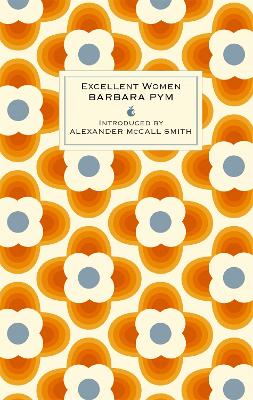
Cover design by Orla Kiely Mildred Lathbury is one of those 'excellent women' who is often taken for granted. She is a godsend, 'capable of dealing with most of the stock situations of life - birth, marriage, death, the successful jumble sales, the garden fete spoilt by bad weather'. As such, though, she often gets herself embroiled in other people's lives - and especially those of her glamorous new neighbours, the Napiers, whose marriage seems to be on the rocks. One cannot take sides in these matters, though it is tricky, especially when Mildred, teetering on the edge of spinsterhood, has a soft spot for dashing young Rockingham Napier. This is Barbara Pym's world at its funniest and most touching.
I'm not entirely sure what I just read. It's beautifully written, but I'd be hard pressed to outline its plot. Beyond being a social commentary on single women in the 1950's, with a sidebar on the changing morays of post-war Britain, there's not a lot happening.
Mildred is a 30-something spinster, the daughter of a clergyman, living on her own in London and living for her local church. Mildred is quietly wry about her lot in life, while also being something of a doormat; a combination that seems incongruous to me, though that itself might be a reflection of how far we've come: I have the luxury of not only thinking wry thoughts, but expressing them, and choosing not being anybody's doormat.
When the flat beneath hers is let to a 'modern' married couple - the kind that were hastily married during WWII - Mildred's life is sucked into the vortex of their melodrama. Again, something I could not relate to, but this time I couldn't even imagine a set of circumstances where Mildred's experience seems logical. Except one, and it's the one I think Pym was using, though obliquely (by today's standards): Mildred was in love with, or crushing hard on, Rocky. There's plenty of evidence that she was - but there's plenty to point to that shows Mildred's misery at doing Rocky and Helena's bidding as well, and again, that seems incongruous to me. People who are crushing on their neighbours (or whomever) are generally happy to be involved in their crush's life. Mildred is highly moral, but there's no evidence that her misery stems from the moral quagmire of crushing on a married neighbor, rather is feels like a bone deep fatigue with always being considered an "Excellent Woman".
Speaking of "Excellent Women", this sort of feels like Pym's true message; 'Excellent Women' are much admired and relied upon, but rarely loved or appreciated; indeed that being called an Excellent Woman is a rather back-handed compliment. If this was, in fact, Pym's intent, she sort of failed in my opinion. The message is there, yes, but it's subtle; maybe a little too subtle, as it's drowned out by all the drama happening amongst neighbours and friends.
There are a few other things going on during all of this: Julian, the vicar's, surprise romance with an unsuitable widow, Mildred's friend Dora - a bitter old prune in the making, and possibly the most awkward courtship I've ever read happening between Mildred and another character. None of which added any depth to the story for me, nor made any of the characters more sympathetic.
As I said though, the writing was wonderful, and highlights included learning about the true meaning of being a slut ::grin::, and what might be one of the best character names ever: Everard Bone, couple with one of the most hilarious lines I've read in a while (context: a turned down dinner invitation):
Immediately he asked this, I realised that there had been a little nagging worry, an unhappiness, almost, at the back of my mind. Everard Bone and his meat.
Buried amidst the terribly prim and proper setting of this book, this line struck me as inordinately funny, and evidence Pym had a wicked sense of humor.
Reading updates
-
Started reading
-
1 February, 2019:
Finished reading
-
1 February, 2019:
Reviewed
